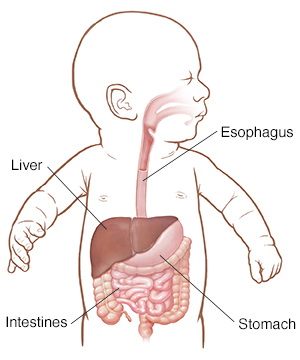Necrotizing Enterocolitis (NEC) in the Newborn
NEC is a serious, life-threatening illness of the gastrointestinal (GI) tract that affects newborns. It may cause death. It occurs when an area of the baby’s bowel (intestine) becomes inflamed and damaged. This damage happens when a part of the intestines isn’t getting enough oxygen. This causes the tissue to die (become necrotic). Bacteria in the bowel may then start to kill tissue from the inner layers of the bowel. The infection may spread to the entire intestine and into the abdomen. NEC is more common in premature babies because the bowel is not yet mature.
 |
| The normal digestive system |
How is NEC diagnosed?
NEC may be suspected if the baby has trouble feeding or vomits, has blood in the stool, a tender abdomen, or a bloated abdomen. An X-ray and ultrasound can show thickening of the bowel wall. It may also show bubbles of gas in the bowel wall.
What causes NEC?
The exact cause of NEC is not known. Any newborn can get NEC. But it happens more often in premature babies, babies with low birth weight, and those who have been formula fed. Human milk, especially from a baby's own mother, has many protective factors that formula can't provide. But even babies who haven't received formula can get NEC. The earlier the baby was born, the higher the risk. NEC in full-term babies is usually linked to something that causes low oxygen levels, such as a congenital heart defect.
What is a "NEC watch" or "NEC scare"?
Babies who are born premature or who have health problems are treated in the NICU (neonatal intensive care unit). NICU staff may suspect that a baby’s bowel may be damaged. This may be referred to as "NEC watch" or "NEC scare." In some cases, this may not turn out to be NEC. The baby's feedings are stopped, and nutrition is given through a tube in a vein. This is called total parenteral nutrition (TPN). It allows the bowel to rest. The baby will be given TPN as well as antibiotics to prevent infection for a short time. In many cases, there is no lasting damage to the bowel. No further treatment is needed.
How is NEC treated?
A baby with NEC will be continually assessed to see if emergency surgery is needed. Treatment may consist of:
-
Medicines and probiotics. Enteral feedings (feedings through the digestive tract) are stopped to rest the bowel. The baby is fed with TPN, and antibiotics are used for a longer period to prevent infection and more damage. In some cases, babies are treated with probiotics. These are live microorganisms that are put into the digestive tract.
-
Surgery. If the baby is very ill, they may need surgery. Surgery may include any or all of the following. It depends on the location and severity of the damage.
-
Placing a drain into the abdomen to ease pressure and inflammation. This allows the bowel to rest and heal.
-
Taking out part of the bowel. The necrotic or dead part of the bowel is taken out. This protects the rest of the bowel and lets it heal.
-
Placing an enterostomy to let a part of the bowel heal by rerouting the stool. In this case, the surgeon will make an enterostomy (also called an ostomy or a stoma). This is done by bringing the open ends of the bowel through an incision in the abdomen. A stoma keeps waste from traveling through the part of the bowel that needs to rest. After the bowel has healed, the ends are then reconnected, and the ostomy is closed.
What are the long-term effects?
Many babies with NEC have no lasting damage. But NEC can cause serious ongoing problems. It can also be life- threatening. If surgery is needed, the outcome depends on how much bowel is taken out. Sometimes the remaining bowel can take over the functions of the part of the bowel that was removed. In some cases, the baby can’t absorb certain nutrients and may need to be on a special diet. In other cases, the child may have a permanent stoma. But a child can thrive with a stoma, or even with much of the colon (large intestine) taken out. In some cases, so much small bowel must be removed that the baby needs to stay on TPN for a long time. This can have other risks, such as infection or liver damage. Sometimes, surgery may not be possible if too much of the bowel has died. This can happen suddenly and without warning.
Online Medical Reviewer:
Dan Brennan MD
Online Medical Reviewer:
Kimberly Lee MD
Online Medical Reviewer:
Stacey Wojcik MBA BSN RN
Date Last Reviewed:
12/1/2022
© 2000-2024 The StayWell Company, LLC. All rights reserved. This information is not intended as a substitute for professional medical care. Always follow your healthcare professional's instructions.